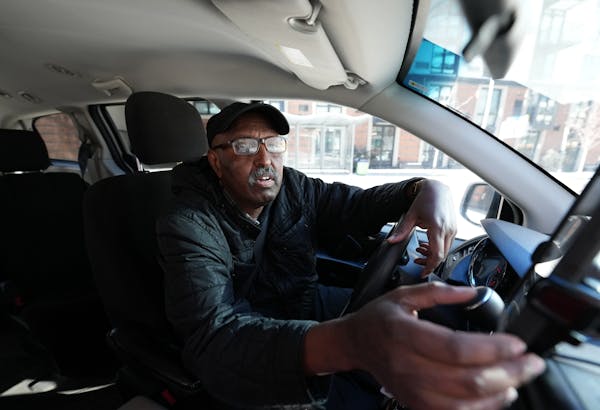The Minneapolis City Council might reconsider its controversial rideshare policy that has prompted Uber and Lyft's announced plans to pull out of the city.
Council Member Andrea Jenkins has introduced a proposal that she says could buy time for the council, and potentially state lawmakers, to figure out a way to keep the ride-hailing giants from leaving when the ordinance takes effect May 1.
The council's new city ordinance sets minimum pay standards for drivers, which Uber and Lyft have said are too high to make it worthwhile to do business here.
Jenkins' proposal to avert the companies' departure is a procedural maneuver added to Thursday's City Council meeting agenda, which now includes a "notice of intent to move reconsideration" of the ordinance codified after last week's vote to override Mayor Jacob Frey's veto of the new rideshare rules.
Jenkins, and perhaps others, will discuss the idea at Thursday's meeting. An actual vote wouldn't happen until the council's meeting on April 11.
Jenkins originally expressed reservations about overriding Frey's veto but ultimately supported the ordinance and the veto override.
In an interview Wednesday afternoon, Jenkins said she's received voluminous complaints about the outcome — but doesn't regret her votes. "It really brings about the urgency," she said of the pushback that's followed the council's actions.
Of her procedural maneuver, she said: "I just hope it gives us an opportunity to work over these next 40 days or so to come to a place where drivers are fairly compensated and all the other entities are able to get on board."
Much was unclear Wednesday — and the 13-member city council is often an incubator of procedural drama — but this much has become apparent: A stout blowback campaign has emerged, with council members feeling gusts from a range of directions.
"It's been chaotic," Jenkins said. "A lot of people are 'in their feelings,' to use a colloquial phrase."
Drivers who feel they were doing fine previously, some advocates for people with disabilities, constituents and even Gov. Tim Walz all have publicly or privately expressed frustration with the council's action.
Lawmakers at the State Capitol are wrestling with the issue, too. Republicans have pushed to strip Minneapolis of its authority to regulate rideshare. Meanwhile, a plan backed by Democrats moving ahead in the Senate could set statewide pay minimums — but that plan currently envisions minimums too high for Uber and Lyft as well.
The backstory
The flurry of recent action stems from the Minneapolis City Council's vote on the veto override, which meant that a new ordinance setting minimum pay for drivers in the city will move forward. Lyft immediately announced it would pull out of the city, while Uber said it would pull out of the entire Twin Cities metro after the May 1 effective date of the ordinance.
Several supporters of the ordinance, who championed it as a victory for workers, had scoffed at the companies' threats to leave. But the companies seem to be making good on them; both have told drivers and riders that they're leaving, and on Wednesday, Uber announced it was permanently closing its only Twin Cities service center.
Chief among critics' frustrations: A state-commissioned study released last week effectively provided a roadmap for how drivers could be paid the equivalent of minimum wage — the stated goal of ordinance supporters. But the minimums the study landed on were well below what the City Council approved and closer to minimums Frey had proposed, which he said the rideshare companies would accept.
The council had been told the study was coming, but decided to vote on the pay minimums ahead of it and approved the plan 9-4. Then Frey vetoed their action, the study came out and the council overrode the veto 10-3. Council supporters of the move appeared to either disregard the study or not fully comprehend it.
What followed was behind-the-scenes scrambling at City Hall, as clerks and council members scrutinized council rules and parliamentary procedures. Meanwhile, several state lawmakers have attempted to whip council votes.
A simple majority of seven votes would be needed to reconsider the ordinance. If that's successful, the council could change it, delay it or kill it with votes by seven members.
The mayor's response
Frey greeted Wednesday's developments with guarded hope.
"Thus far, the council has been unwilling to engage all relevant parties in developing the ordinance they pushed through," he said in a statement. "But there has been and still is room for compromise to ensure drivers who rely on rideshare services for a paycheck get a raise and riders who rely on the service can continue getting around our city."
The statement from the mayor's office noted that Frey will continue to work to prepare for the rideshare services' departure, including meeting with driver advocacy and labor groups.

Want to share info with the Star Tribune? How to do it securely

'Safe recovery sites' would offer syringes, naloxone and more to people using drugs. The plan could be in peril.
New Minnesota GOP leaders seek peace with party's anti-establishment wing

Who is Republican Lisa Demuth, Minnesota's first House speaker of color?

